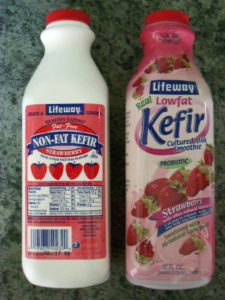The number of men and women who are affected by diabetes is quite alarming. This is one ailment that really keeps the medical community worried. While treatments for diabetic people are there and new studies are being conducted, you may adopt additional steps to combat it effectively. “Functional Nutrition” is a new and emerging filed in nutrition where foods are used to treat disease at the cellular level. One type of food in these functional foods category is Kefir which may be beneficial in controlling diabetes.
What is Kefir?
Kefir is a cultured milk product with yogurt like appearance but it tastes more sour and tart. It is also called Bulgaros. Usually, milk from vaccinated cows and goat is fermented with kefir grains. These grains contain healthy bacteria that cause fermentation and in the process infuse the resultant substance with probiotics (healthy bacteria), enzymes, and several nutrients. Consumable kefir is laden with nutrients like folic acid, vitamin K, and minerals like phosphorous, magnesium and calcium. It is also rich in digestible protein.
Types of Kefir
Milk kefir is the most popular variant. However, water kefir grains are also gaining popularity. They are generally mixed with water and sugar solution to make a carbonated bubbly drink, a substitute for regular soda drinks. Kefir grains resemble small cauliflower florets.
Why Use Kefir for Diabetics
A number of clinical studies indicate that consuming kefir can be quite beneficial for those afflicted with diabetes type 2. As usage of kefir grains initiates the process of fermentation, both in water and milk, they generate lactic acid. This is deemed as helpful for people with diabetes. Consuming Kefir can help diabetics bring down the level of blood sugar levels owing to the acidic factor and also it’s anti oxidant effects. Besides, the digestible protein in kefir comes without the risk to cardiac health or rise in cholesterol levels. Kefir can also be given to children who are diabetic. Along with diabetes control, Kefir is also helpful for boosting immunity and it also helps the body fight bacterial infections.
In one animal study from Brazil published in the journal Food & Function in 2016 showed that kefir supplementation helps the metabolic syndrome by reducing cholesterol, insulin resistance, fasting glucose, fasting insulin, and in reducing body fat. In another study done in human subjects from Iran showed that after using kefir for 2 months, the Hgb A1c levels were reduced significantly.

Using Kefir for Diabetes
Based on your preference, Milk or water kefir can be used. Water kefir can be used to make tasty, frothy soda type drink minus the harmful effects of soda. Milk kefir can be found in many forms in stores- as milk and cheese. You need not always buy kefir drinks or cheese at a grocery store. Making yourself a kefir drink or cheese with grains is not difficult. This way you can choose the type of milk and ensure no artificial flavour is used. You can make smoothies with kefir for giving it to diabetic kids.
Things to remember
While consuming kefir is great for diabetes, you should keep a few things in mind to obtain maximum benefits:
- You may find the flavoured kefir more enticing, but the plain variant is the one that comes without any artificial stuff!
- If you are both diabetic and obese, then consuming kefir should be done with caution. Consuming kefir does not necessarily lead to gaining excess flab. It is calorie-dense and on an average a cup of regular kefir has 150 calories. So, you should intake it in moderation if weight loss is also on your agenda! For diabetics, weight gain can only worsen the situation. The flavoured kefir variants tend to contain more calories and they also contain corn syrup, hence you may intake additional sugar by consumption.
- There is no denying the health benefits, especially digestive benefits offered by probiotics or healthy bacteria. Consuming kefir in any form results in enhanced digestive tract health for most people. However, a section of people face difficulty in digesting probiotics. If eating probiotics rich foods causes bowel problems and stomach issues, then kefir is probably not suitable for you.
Summing it All Up
Overall, kefir is a nutritious food that offers benefits to those with diabetes. Its consumption can offer you many other health benefits too. Kefir is available in various forms and can be made with both milk and water, based on your liking. However, sticking to the unflavoured version of kefir proves to be more beneficial. You can also make kefir at home rather than buying pre-made drinks or foods. It is prudent to consider health issues like calorie intake before consuming it.
